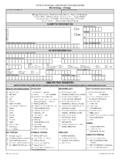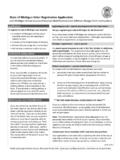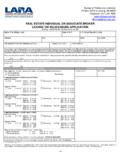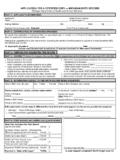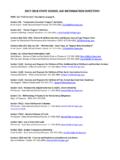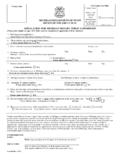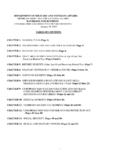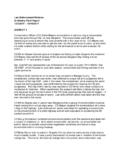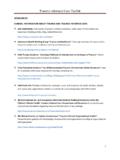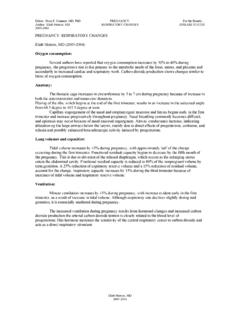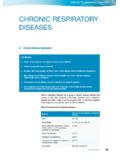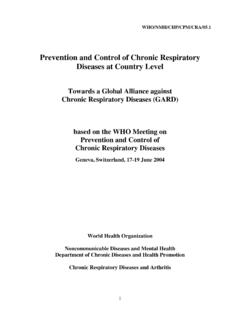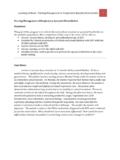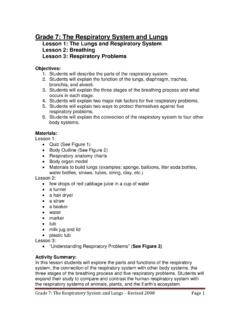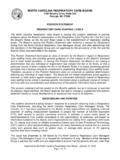Transcription of Guidelines for Influenza and Respiratory Virus …
1 1 Guidelines for Influenza and Respiratory Virus Outbreaks in Long-Term Care Facilities Michigan Department of Health and Human Services June 2017 This guidance outlines Michigan Department of Health and Human Services (MDHHS) recommendations on Influenza and other Respiratory Virus outbreaks. Residents of long-term care facilities can experience severe and fatal illness during Respiratory Virus outbreaks, therefore prompt recognition and management of outbreaks is critical. Any suspected outbreaks should prompt immediate action as outlined below. Please call your local health department1 or the MDHHS Division of Communicable Disease at (517) 335-8165 with any questions.
2 Definition of a Respiratory Virus Outbreak in Long-Term Care (LTC) Settings2 1. Two or more residents develop Respiratory illness within 72 hours of each other OR 2. One laboratory-confirmed positive case ( Influenza , Respiratory syncytial Virus , parainfluenza, human metapneumovirus, adenovirus) in a resident along with other cases of Respiratory infection OR 3. A sudden increase over the normal background rate of acute Respiratory illness (ARI) cases, with or without documented fever Note that elderly or medically fragile persons may manifest atypical signs of Respiratory Virus infection and may not present with fever.
3 Action Steps The following should be undertaken immediately by the LTC facility with local health department (LHD) coordination as needed. Testing and Reporting The LTC facility should contact their LHD to report every suspect or confirmed Respiratory outbreak. Refer to the LHD directory and reportable disease list found here1. Develop a plan for Respiratory Virus testing with consideration for a range of possible viral pathogens. The MDHHS Bureau of Laboratories can provide testing support to confirm the outbreak etiology. Contact your LHD for consultation and coordination as needed. If needed, order MDHHS test kits (#45) by calling (517) 335-9867 or faxing the MDHHS Clinical Specimen Shipping Units order form to (517) 335-9039.
4 Local Health Department The LHD must notify MDHHS of a Respiratory Virus outbreak or apparent ARI cluster, either by phone (517-335-8165) or via an outbreak reporting form, such as the MDHHS Initial Cluster Report form3, faxed to 517-335-8263. If a LHD receives a positive Respiratory Virus lab report for a known resident of a LTC facility, they should follow up with the facility to ensure no other Respiratory illness is present. 2 For Influenza outbreaks, LHDs should enter associated cases into MDSS, using their choice of the individual Influenza form for each case OR entering the number of cases into the weekly aggregate Influenza case total.
5 Infection Control Institute standard and droplet precautions as appropriate, including the use of face masks if direct contact within 3 feet of patient ,4,5 Post handwashing signs. Emphasize Respiratory hygiene and cough Review Influenza vaccination status of residents and staff. Vaccinate all unvaccinated residents and staff with the current seasonal Influenza vaccine unless medically contraindicated. If Influenza is suspected or confirmed, consult with the facility Medical Director regarding antiviral treatment and All LTC residents who have confirmed or suspected Influenza should receive antiviral treatment immediately; treatment should not wait for laboratory confirmation.
6 As soon as an Influenza outbreak is confirmed, all non-ill residents should receive antiviral prophylaxis, regardless of vaccination status. Antiviral prophylaxis can be considered for unvaccinated personnel who provide care to persons at high risk of complications. Monitor for Influenza development in all residents/personnel receiving prophylaxis. Notify the health department if a person develops Influenza while on or after receiving antiviral chemoprophylaxis. Cohort and/or isolate ill residents as feasible. 2 Restrict ill staff from patient care. Restrict movement of other staff between wards.
7 Assure facility policy that unvaccinated staff wear a face mask at all times. 2 Apply the facility policy for restriction of ill visitors; consider restriction of all visitors. Post visitor signs. Implement the facility policy for limiting or deferring new Avoid new admissions or transfers to wards with symptomatic residents Continue droplet precautions for residents with suspected or confirmed Influenza for 7 days after illness onset or until 24 hours after the resolution of fever and Respiratory symptoms, whichever is longer Maintain Influenza precautions and conduct daily active surveillance for Respiratory illness among residents.
8 Staff and visitors until at least one week after the last known illness has Facilities are encouraged to educate staff on the signs and symptoms of various Respiratory viruses, testing procedures, the need for ongoing Respiratory hygiene, and appropriate control ,4,5,6,7 Ideally, education takes place before an outbreak and is routinely updated. 3 Essential Reference Websites 1. Local Health Department Directory and List of Reportable Diseases 2. Interim Guidance for Influenza Outbreak Management in Long-Term Care Facilities 3. MDHHS Initial Cluster Report Form (under Reporting Forms ) - can be used to report outbreaks 4.
9 Standard Precautions Excerpt from the Isolation Guideline (see Section ) 5. Droplet Precautions Excerpt from the Isolation Guideline (see Section ) 6. Respiratory Hygiene/Cough Etiquette 7. Guidelines for Environmental Infection Control in Health-Care Facilities 8. Prevention Strategies for Seasonal Influenza in Healthcare Settings Influenza : (MDHHS) (CDC) Respiratory Syncytial Virus : (CDC) Parainfluenza: (CDC) Adenovirus: (CDC) Enterovirus: (CDC)
